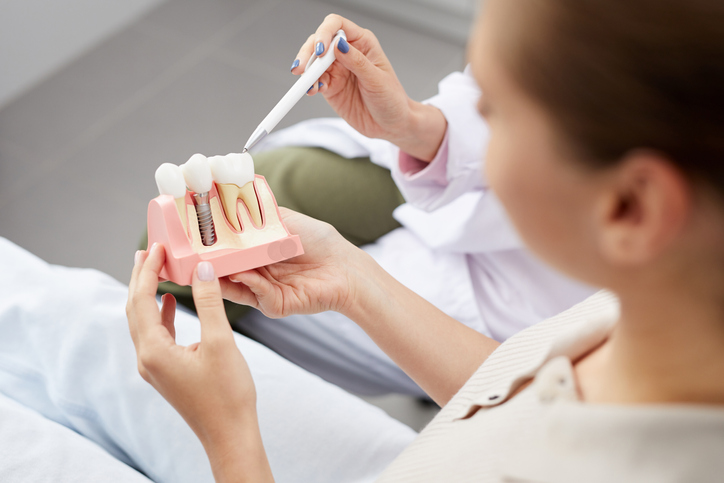
Traditional dental implants aren’t your only choice to replace missing teeth. Mini dental implants are another option.
According to the American College of Prosthodontists, some 178 million Americans are missing at least one tooth. For decades, bulky dentures and bridges were the only options to replace missing teeth. But modern dentistry has moved beyond those choices. Today, dental implants have emerged as a newer alternative to complete your smile.
Yet many people who need tooth replacement may not qualify for traditional dental implants. If you are one of them, don’t give up on implants! Instead, you can try for a mini dental implant. Read on to learn more about this proven solution and how it’s just as effective as a traditional implant.
What are mini dental implants?
The most significant difference between mini dental implants and traditional ones is size. Traditional dental implant screws come in two pieces between 3.25 millimeters and 5 millimeters in diameter, or around 0.12 or 0.2 inches across. Mini dental implants use a one-piece screw less than 3 millimeters in diameter, or about one-tenth of an inch. At the end of the mini dental implant screw is a small ball to which the prosthetic tooth is attached.
Because of their smaller size, mini dental implants can be applied via a much less invasive procedure. After numbing the area with local anesthesia, the dentist drills a small hole in the jawbone and inserts the screw. The replacement tooth is attached to the post. You don’t need stitches, and the procedure may take only one office visit. It takes about a day or two to recover, with the only restriction as avoiding sticky foods that could pull the implant out. Your dentist may recommend a soft food diet for a few days.
Are mini dental implants right for you?
A mini dental implant is a perfect solution for those who don’t have enough bone mass in the jaw to hold a traditional implant. A mini dental implant can be a viable option for those who have worn dentures for many years and have lost bone mass.
Therefore, a bone graft isn’t needed before securing the implant. Since a bone graft takes months to heal before a traditional implant can be placed, a mini dental implant significantly reduces the procedure and recovery time. The shorter timeline also benefits those who cannot undergo a lengthy oral surgery for whatever reason.
Mini dental implants can also fit into narrow spaces in the mouth and can replace smaller teeth. And like traditional dental implants, mini dental implants offer a more permanent solution to missing teeth than dentures and bridges. The implants will look and function like natural teeth. Mini dental implants also maintain the structure of your jaw.
Yet a mini dental implant may not be suitable for everyone. Those with chronic conditions such as diabetes and vascular disease that could interfere with healing may not be good candidates. Smokers and those who take certain medications, such as anticoagulants, also fall into that category.
Severe tooth decay and gum recession could also disqualify someone from getting mini dental implants. Although less bone mass is required than in traditional dental implants, a good amount of bone is still needed for the implant to succeed.
Mini dental implants may be viable alternative to restore missing teeth, but note that they generally won’t last as long as their traditional counterparts. In many cases, they are used as a temporary solution. But with proper oral hygiene, mini dental implants can give you a complete set of teeth for many years.
Don’t live with missing teeth!
Schedule an appointment at Espire’s Colorado Springs location today! Our highly trained dentists can discuss whether mini dental implants are right for you and guide you through the process. Don’t live near our Colorado Springs office? Find one of our other locations near you.
Colorado Springs
8610 Explorer Drive #315
Colorado Springs, CO 80920

